The House Just Passed The Fiscal Responsibility Act. Here’s What’s In It

The House of Representatives passed on Wednesday night the Fiscal Responsibility Act, which would raise the debt ceiling into January 2025.
The legislation, negotiated by Speaker of the House Kevin McCarthy and President Joe Biden, allows the federal government to take on unlimited debt through January 1, 2025. Both parties overwhelmingly supported the Fiscal Responsibility Act, with 165 Democrats and 149 Republicans voting in favor. Seventy-one Republicans and 46 Democrats opposed it. The Senate is planning to take up the legislation immediately, since the federal government will likely default on its debt on June 5.
Debt limit bill easily approved with big bipartisan majority in the House – next stop is the Senate. pic.twitter.com/Qz3yovl6dF
— Jamie Dupree (@jamiedupree) June 1, 2023
As part of McCarthy and Biden’s negotiations, the two agreed on various provisions that will impact the federal budget over the next several years. Here’s what’s in the Fiscal Responsibility Act:
Debt ceiling increase:
The key provision of the Fiscal Responsibility Act suspends the debt ceiling through January 1, 2025. Unlike the House-passed Limit, Save, Grow Act, the Fiscal Responsibility Act does not raise the debt ceiling by a specific dollar amount. The Limit, Save, Grow Act would have raised the debt ceiling through March 2024 or by $1.5 trillion.
Critics of the Fiscal Responsibility Act like Republican South Carolina Sen. Tim Scott have argued that the failure to affix a dollar amount to the debt ceiling effectively gives President Joe Biden “an open checkbook.” Others have placed the Fiscal Responsibility Act’s effective debt ceiling increase at $4 trillion.
Spending caps:
The Fiscal Responsibility Act caps non-defense discretionary spending at Fiscal Year 2022 levels for Fiscal Year 2024. It sets FY2024 non-defense discretionary spending at $704 billion, and the same category at $711 billion in FY2025. Defense discretionary spending will be set at $886 billion in FY2024 and $895 billion in FY2025. It also encourages Congress to pass appropriations bills for each of the 12 cabinet-level federal agencies by imposing sequestration if the individual bills are not passed.
“This bill, in year one, might cut $12 billion, if you just want to be generous,” Florida Rep. Byron Donalds, who opposes the legislation, said Tuesday. “The spending caps that are in this deal are something we were not supportive of and I will tell you that all the spending caps do is keep the post-COVID spending levels for the federal agencies intact.”
Permitting reform:
One provision requires the Secretary of the Army to approve all permits related to the Mountain Valley Pipeline within three weeks of the bill’s passage, a significant win for embattled Democratic West Virginia Sen. Joe Manchin. Manchin attempted to pass permitting reform and get the pipeline approved in the 117th Congress, but a left-wing revolt killed his Energy Independence and Security Act. Several Democrats, including Virginia Sen. Tim Kaine and Arizona Rep. Raul Grijalva, have announced their opposition to the pipeline’s inclusion.
Other provisions, adopted from the Energy Independence and Security Act, require environmental impact assessments to be completed within one year and environmental impact statements within two years. Those limits amend the National Environmental Policy Act.
Funding clawbacks:
The Fiscal Responsibility Act claws back $28 billion in unspent COVID-19 stimulus funds. It also cuts $1.4 billion in IRS funding, and the White House and GOP leadership reportedly have a handshake agreement to redirect $20 billion more.
AUTHOR
MICHAEL GINSBERG
Congressional correspondent.
RELATED ARTICLE: ‘A Step In The Right Direction’: Speaker McCarthy Defends Debt Ceiling Agreement After Conservative Criticism
EDITORS NOTE: This Daily Caller column is republished with permission. ©All rights reserved.


Leave a Reply
Want to join the discussion?Feel free to contribute!